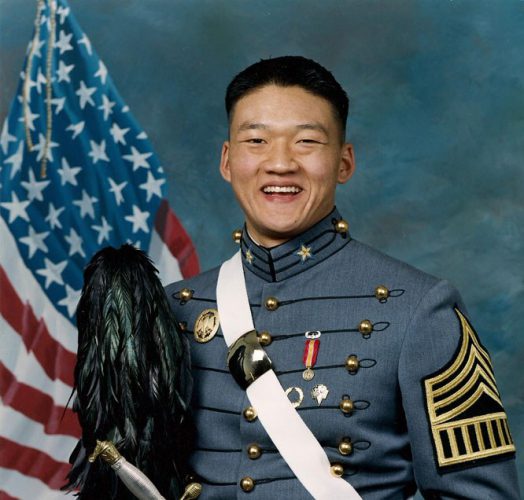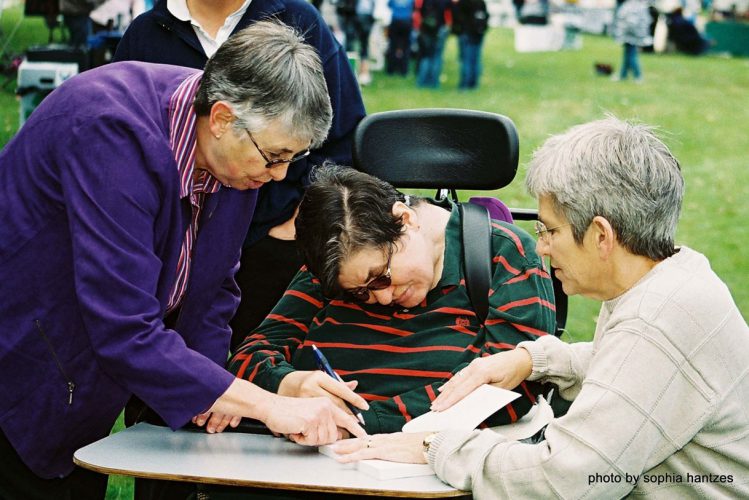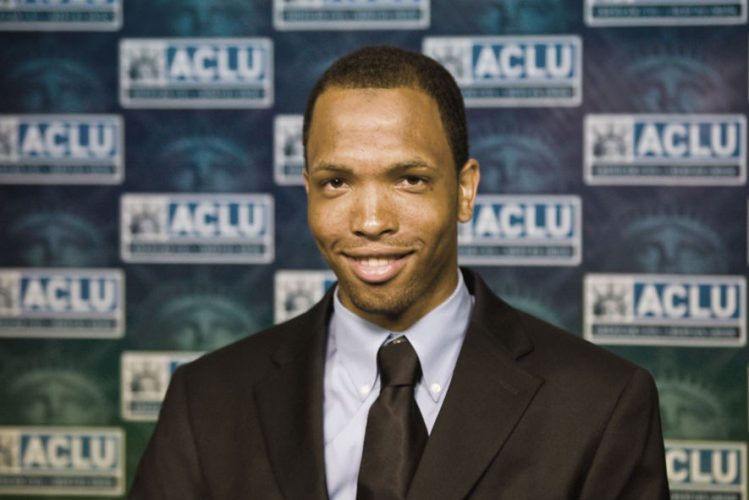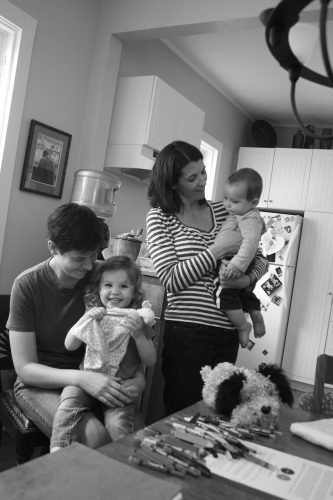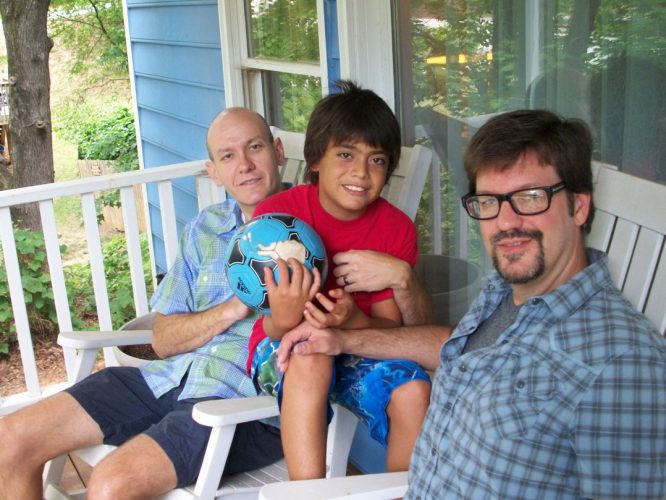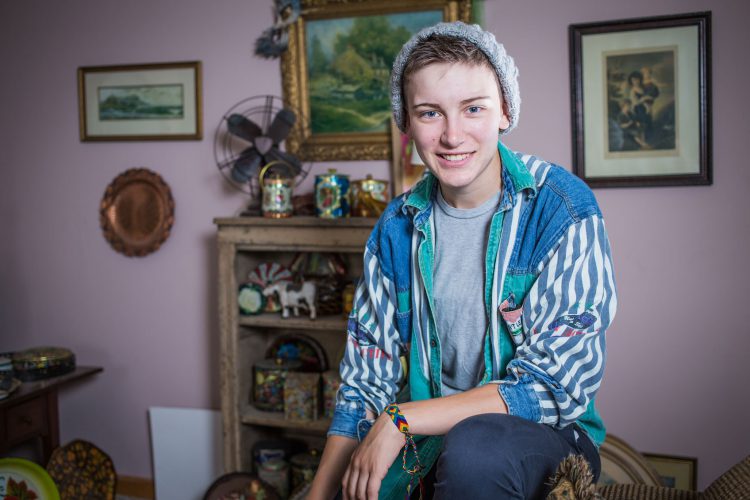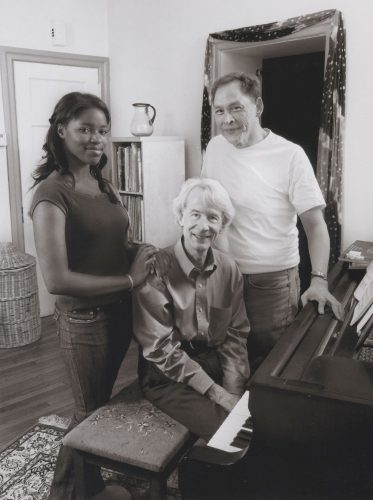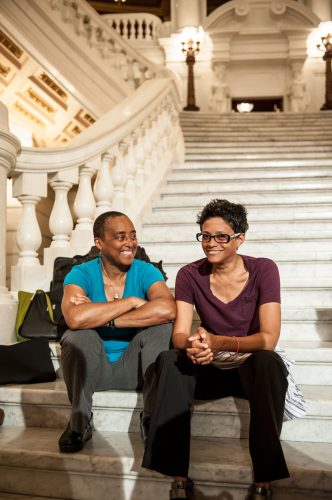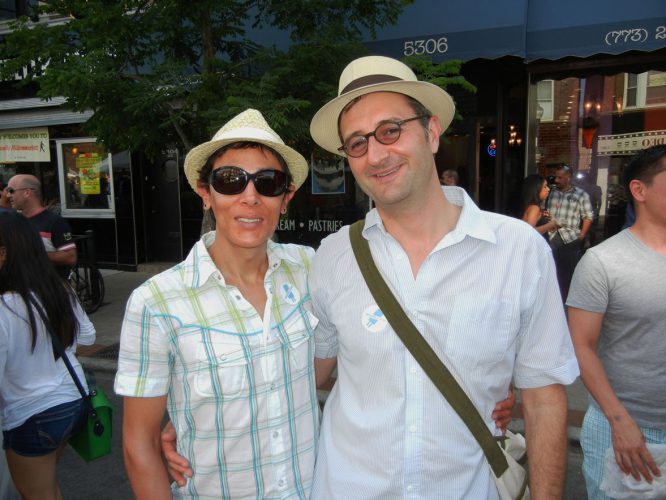These stories represent just a few of the countless individual LGBT Americans whose lives were impacted by court decisions—or by the refusal of the courts to hear their cases.
The Debate’s Impact on Real Lives
“I’m willing to put my life on the line for this country; don’t I at least deserve the same protection and recognition for my relationships as any straight civilian?”
—Lt. Dan Choi in HuffPost Politics, March 18, 2010
Speaking Out for the Right to Serve: Dan Choi
In March 2009, U.S. Army National Guard Lt. Dan Choi—West Point graduate, Iraq War combat veteran, valued Arabic translator—was discharged after he came out on the Rachel Maddow Show.
Motivated by a sense of injustice, Choi went public. He challenged his dismissal in an open letter to President Obama and the U.S. Congress, becoming a symbol for the military’s “Don’t Ask, Don’t Tell” policy.
In the courts: Choi turned to the public because the courts had repeatedly upheld the dismissal of decorated military personnel for being openly gay or lesbian. In 2010, Congress repealed “Don’t Ask, Don’t Tell.”
Standing Up for the Right to Care for Your Partner: The Sharon Kowalski Story
After Sharon Kowalski sustained a traumatic brain injury in a 1983 car crash, her family refused to let her partner—Karen Thompson—see her or act on her behalf. Because the two had no legal rights as a couple, Thompson mounted a public campaign to bring Sharon home. In the process, she went from closeted lesbian to vocal activist. In 1990 she was the featured speaker at the first Disability Pride Parade in Boston, MA.
In the courts: Despite evidence of their committed, long-term relationship, Thompson met with nothing but obstacles in her fight to gain guardianship of Sharon. After more than eight years and $300,000 in legal expenses, the court finally granted Thompson legal custody of Sharon in 1991.
Fighting Employment Discrimination: Andre Cooley
Andre Cooley was a valued senior corrections officer with an exemplary record in the Forrest County, Mississippi Sheriff’s Department. In 2010, a day after his supervisor learned that he was gay, Andre Cooley was fired.
After filing his suit, Andre Cooley was reinstated, and his employer revised its non-discrimination policy to make clear that no one could be fired for their sexual orientation.
In the courts: In Mississippi, people who work for private firms are not legally protected from employment discrimination based on sexual orientation. Because Andre Cooley worked for the Forrest County Sheriff’s Department (a governmental entity), though, he was protected by the U.S. Constitution. Cooley decided to take his case to the courts, seeking equal protection and the due process rights guaranteed by the 14th Amendment.
Pursuing Second-Parent Adoption: Crystal, Leigh, and their Children
Leigh Smith, a stay-at-home mom, and Crystal Hendrix, an elementary school librarian, live in North Carolina with their children, Quinn and Joe.
In 2010, the North Carolina Supreme Court banned second-parent adoptions for same-sex couples. “I am the biological mother,” said Crystal, “which means I am the legal mother in the eyes of the law; I want to make sure that Leigh is the one raising our children if something happens to me. Second parent adoption is the way to ensure that Leigh and Quinn and Joe have that security.”
In the courts: The ACLU and the ACLU of North Carolina Legal Foundation filed a lawsuit on behalf of six same-sex couples (including Crystal and Leigh), seeking the freedom to marry and the right to obtain second-parent adoptions for their children. In October 2014, the district judge ruled that North Carolina’s marriage bans were unconstitutional, meaning that these couples could legally adopt each other’s children.
Pursuing Second-Parent Adoption: Shawn, Craig, and their Son
Together 18 years, lifelong Carolinians Shawn Long (an administrative coordinator at a nonprofit organization) and Craig Johnson (a clinical program assistant at a pharmaceutical company) had adopted Isaiah when he was a toddler. “I can’t imagine life without Isaiah,” said Shawn; “he’s everything to us.” Because of North Carolina’s second-parent adoption ban, though, only Craig was a legal parent to Isaiah.
In the courts: The ACLU and the ACLU of North Carolina Legal Foundation filed a lawsuit on behalf of six same-sex couples (including Shawn and Craig), seeking the freedom to marry and the right to obtain second-parent adoptions for their children. In October 2014, the district judge ruled that North Carolina’s marriage bans were unconstitutional, meaning that these couples could legally adopt each other’s children.
Asking for Respect: Issak Wolfe
When Pennsylvania’s Red Lion Area School District refused to include transgender student Issak Wolfe on the ballot for senior prom king, instead listing his birth name under “prom queen,” he was humiliated—and he spoke out. In a statement he read before the district school board, the teen said: “ALL schools should try to be safe, welcoming spaces for all of their students. And my school should be no different.”
In the courts: Although Issak’s case did not go to the courts, the ACLU and the ACLU of Pennsylvania sent a letter to the Red Lion Area School District on his behalf. In response, the school district allowed Issak to march at graduation in male robes. However, the district insisted on putting his birth name on his diploma and reading that name at the graduation ceremony.
Requesting the Right to Marry: Len and Fernando
While they entered into a civil union in Vermont in 2004, attorneys Fernando Chang Muy and Len Rieser dreamed of marrying in Pennsylvania, where they live, work, and have raised their daughter, Isabel. “We did everything we possibly could while Isabel was growing up to insure our well-being as a family,” Len says, “but if we could have been married, it would have made a big positive difference in our lives.”
After Pennsylvania lifted its marriage ban in 2014, Fernando and Len married.
In the courts: The ACLU, the ACLU of Pennsylvania, and volunteer legal counsel filed a federal lawsuit on behalf of 21 Pennsylvanians who wanted to marry in Pennsylvania or wanted the Commonwealth to recognize their out-of-state marriages. In May 2014, the district judge issued a decision striking down Pennsylvania’s marriage ban as unconstitutional. The following day the governor announced he would not appeal the decision.
Requesting the Right to Marry: Angela and Gail
Philadelphians Angela Gillem, a clinical psychologist and professor, and Gail Lloyd, a filmmaker and visual artist, were registered as domestic partners, but wanted to marry: to publicly share their love and commitment—but also for the legal and economic security that marriage can provide. They worried that should one of them pass away, the other would have to pay a hefty inheritance tax on the home they had paid for together. And they worried that Gail—an artist without a steady income—would suffer financially should Angela, the primary breadwinner, be first to pass away.
In the courts: The ACLU, the ACLU of Pennsylvania, and volunteer legal counsel filed a federal lawsuit on behalf of 21 Pennsylvanians who wanted to marry in Pennsylvania or wanted the Commonwealth to recognize their out-of-state marriages. In May 2014, the district judge issued a decision striking down Pennsylvania's marriage ban as unconstitutional. The following day the governor announced he would not appeal the decision.
Seeking Immigration Equality: Luis and Brent
In 2001, Luis and Brent wed in Chicago. Luis is from Mexico; Brent is from the United States. Because their marriage was not legally recognized, though, they did not enjoy the same protections as heterosexual, bi-national married couples. As a result, in 2008 Luis was ordered deported from the United States—with Brent unable to sponsor him as a legal spouse. While the two legally married in Iowa in 2013, Luis remains under orders of deportation. “With the threat of deportation,” says Brent, “we are not ‘to have and to hold.’”
In the courts: Since 2000, a number of bills that would have given equal immigration rights to bi-national, same-sex partners have stalled in Congress. However, the Supreme Court decision of June 2013, in which the federal government recognized same-sex marriages, has provided some of the benefits the bills had intended.
“I stood up for myself; I stood up for other students in the future—and that’s what counts.”
—trans high school senior Issak Wolfe, on the day he pleaded his case before the Red Lion Area School Board, May 2013
